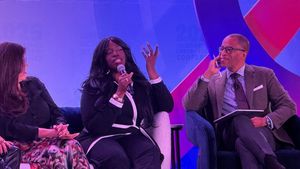While April 12th is celebrated as the Equal Pay Day in America the women in the Washington D.C. region found that they earn 20 percent less than men. According to the U.S Census Bureau women nation wide are paid just 77 cents for every dollar that men earn, according to a new study.
The Washington Area Women’s Foundation conducted a study entitled Portrait of Women & Girls in the Washington Metropolitan Area (Portrait Project 2010), which yielded some some frustrating results. Portrait Project 2010 found:
- Men’s annual median earnings in our region ($63,738) are 20 percent higher than women’s annual median earnings ($51,338). While this is lower than the national gap of 22 percent, the local gap is closing at a slower rate than the national gap.
- African American women working full-time make 45 percent less than white men in our region – a wage gap that is much larger than the national wage gap of 38 percent between Black women and white men.
- The earnings of Asian women and Latinas also lag significantly behind those of white men, with earning gaps of 41 percent and 63 percent respectively.
Portrait Project 2010 also shows that pay inequities persist across all types of occupations, even in those in which women represent the majority of workers. Women predominate in office and administrative support occupations, but their median earnings ($41,690) are still 8.9 percent lower than men in similar positions. And the largest gender earnings gap is found in healthcare practitioner and technical occupations where women’s median earnings ($60,972) are 38 percent lower than men’s.
“Closing the wage gap is not a women’s issue,” said Nicky Goren, president of Washington Area Women’s Foundation. “A gender wage gap has major repercussions on our entire community. Paying women what they deserve will mean more economically secure families and a more prosperous region. And to quote the National Women’s Law Center’s recent campaign: ‘women are not worth less.” “Portrait Project 2010” also notes that, because Social Security benefits are tied to earnings, the impact of lower wages for working women is cumulative.






















































































 Cindy Ord/Getty Images
Cindy Ord/Getty Images























